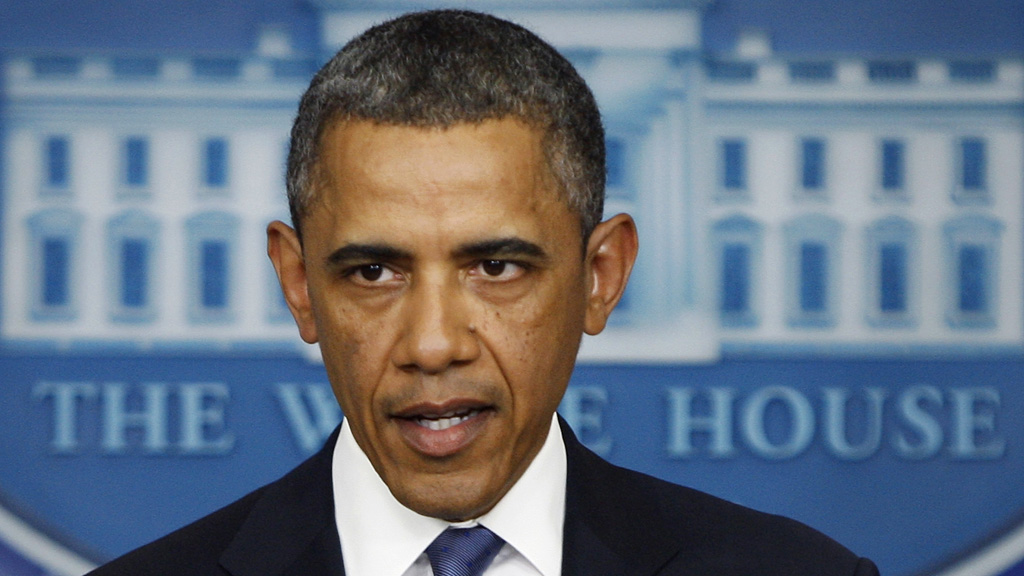Fiscal cliff: America’s economy hangs in the balance
The clock is ticking: as the US Congress begins a rare Sunday session, the pressure is mounting on both sides to agree a budget deal.
Welcome to the fiscal cliff, 2012 edition – with just over a day to go, President Obama took to the airwaves this morning, telling NBC’s Meet the Press that the Republicans were standing in the way of agreement, by refusing to so much as countenance any tax increases.
“The way they’re behaving is that their only priority is making sure that tax breaks for the wealthiest Americans are protected,” Obama said. “That seems to be their only overriding, unifying theme.”
If nothing is agreed by midnight tomorrow, then a package of sweeping tax rises and spending cuts will be automatically triggered, costing the economy hundreds of millions of dollars.
That will affect almost every American – costing the average family more than $2,000 a year. The impact could be so sharp, it could well trigger another recession – affecting economies around the world.
“Modestly optimistic”
But despite the huge pressure, the all-night talks and the intensive negotiations, there are still few signs that the parties can come to a deal. The president isn’t hopeful, either: “I was modestly optimistic yesterday”, he said. “but we don’t yet see an agreement. And now the pressure’s on Congress to produce.”
The pressure is greatest on Harry Reid and Mitch McConnell, who lead their parties in the Senate: and who are likely to face a damaging backlash from voters if they can’t find that elusive compromise.
What is the fiscal cliff? Your questions answered
Up for debate, or lack of it: estate taxes, unemployment benefits, Medicare payments to doctors – and the biggest hurdle of all, those tax increases: Democrats want those earning more than $250,000 a year to pay more, Republicans want that threshold to be $400,000 at least.
McConnell has the biggest mountain to climb: many in the GOP simply won’t countenance any kind of tax increase – while insisting on far steeper cuts, especially in entitlement spending, than Democrats are willing to consider.
Some Republicans have gone so far as to accuse the president of an “addiction to spending” – and protecting benefit claimants at the expense of small business owners and farmers, who they claim will be adversely affected by the Obama proposals.

Right now, the White House believes it has been making all the running. “The offers that I’ve made…have been so far that a lot of Democrats get mad at me.” Mr Obama told Meet the Press, and it’s true that many in his party would rather he held his ground.
“Failure of leadership”
But doing nothing is simply not an option: not with the stakes this high, the consequences potentially this serious.
“All I know”, said Republican senator Tom Coburn, “it’s a failure of leadership from everybody.” But polls have shown that voters are likely to hold the GOP responsible for blocking a deal – more evidence of the dysfunction at the heart of Washington that has already given politics such a bad name.
Amid all the backbiting and gloomy talk of plunging over the fiscal cliff – there has been one glimmer of optimism. Leading Republican senator Lindsey Graham, who’s been singularly pessimistic about the chances of agreement, has now conceded victory to Obama.
He told Fox News Sunday that the President had managed to stand his ground and would get the tax rate increases he wanted. “Hats off to the president”, he said, suggesting a deal would be worked out by the deadline.
If the Reid/McConnell talks come to nothing then they will go back to brief their caucuses before the president’s plan is put to a vote before both Houses tomorrow.
Looming over it all – the continued stability of the US economy, and that fragile recovery that was fought so hard to win.
Given the consequences of failure, can a compromise really be so hard to reach?
Felicity Spector writes about US politics for Channel 4 News.
-
Latest news
-
Taylor Swift’s new break-up album breaks records3m

-
NHS trust fined £200K for failings that led to death of two mental health patients3m

-
Sunak vows to end UK ‘sick note culture’ with benefit reform3m

-
‘Loose talk about using nuclear weapons is irresponsible and unacceptable’, says head of UN’s nuclear watchdog3m

-
‘There wasn’t an Israeli attack on Iran,’ says former adviser to Iran’s nuclear negotiations team7m

-




